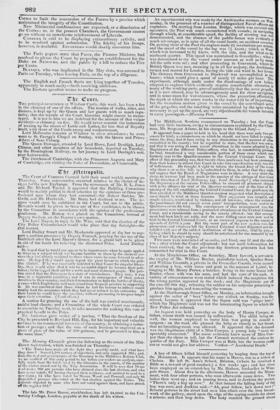An experimental trip was made by the Archimedes steamer, on
Wed. nesday, in the presence of a number of distinguished Naval officers and engineers. On starting from London Bridge, which was covered with spectators, the Pool was much encumbered with vessels; in navigating through which, at considerable speed, the facility of steering was well demonstrated, anti the absence of the paddle-boxes was evidently of much advantage, as in spite of all the usual bustle, no accident occurred. On getting clear of the Pool the engines made 22 revolutions per minute and the speed of the vessel by the log was 7* knots ; which at Wool: which was increased to 9.-1- knots, with the tide, and the wind on the starboard quarter. This speed was maintained to Greenhithe ; whoa it was determined to try the vessel under canvass as well as by steam, All the sails were set ; and after proceeding to Gravesend, where the British Queen was met, steaming up in all her majesty, the Archimedes turned and started for London, having the tide and wind in her favour, The distance from Gravesend to Blackwall was accomplished in two hours ; which would give a speed of nearly 13 miles per hour. This experiment, although made under the disadvantage of new boilers, adapted to engines which evidently require considerable alteration in many of the working parts, proved satisfactorily that the screw propel/o, as it is now altered, may be advantageously used for river navigation, and in Some cases the war-steamers, where the protection afforded lv the depth at which the screw works in the water will be of importance; but the tremulous motion given to the vessel by the centrifugal action of the propeller, and the rumbling noise occasioned by the spur-wheels necessary to get up the speed, are very objectionable for vessels intended to carry passengers.—Morning Post.


























 Previous page
Previous page